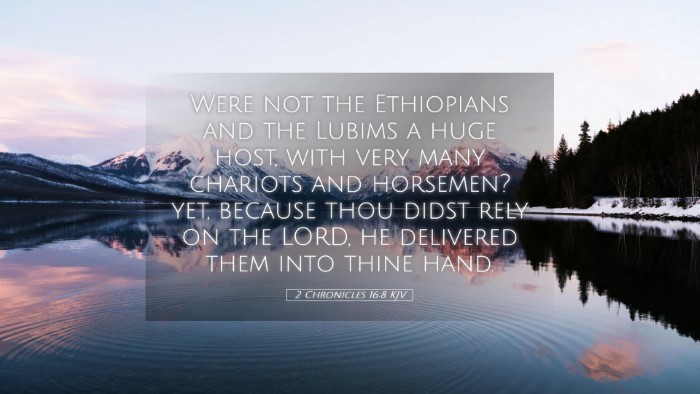Commentary on 2 Chronicles 16:8
Verse Reference: 2 Chronicles 16:8: "Were not the Ethiopians and the Lubims a huge host, with very many chariots and horsemen? Yet, because thou didst rely on the Lord, he delivered them into thine hand."
Introduction
This verse serves as a critical reflection on the nature of faith and reliance on God, contrasting human trust in military prowess with the divine intervention available to those who seek God's help. Historical context enriches the meaning of this passage, demonstrating the powerful contrasts between reliance on human strength versus divine support.
Historical Context
The background of 2 Chronicles 16 provides an insight into the life of King Asa, one of Judah's kings, whose reign was marked by a profound commitment to seeking the Lord and instituting reforms. When faced with threats from powerful armies, Asa initially sought the Lord and experienced His deliverance, notably against the Ethiopians.
- Military Might: The phrase "Ethiopians and the Lubims" references a significant military threat, indicating the formidable nature of the opposition Asa faced.
- Divine Deliverance: The rhetorical question underscores the miraculous nature of the victory, highlighting Asa's reliance on God rather than his own military strength.
Insights from Public Domain Commentaries
Matthew Henry
Matthew Henry emphasizes that Asa exemplifies a man who, in times past, relied on God, thus achieving a great victory. He notes that Asa's failure to do so again signifies a turning point in his life. Henry states that the acknowledgment of God's past help should instill a continual faith in our present-day challenges.
Albert Barnes
Albert Barnes focuses on the concept of reliance on God versus reliance on human alliances. He points out that the verse serves as a reminder of God's ability to deliver regardless of human calculation. Barnes articulates that in spiritual warfare, over-reliance on diplomatic or military solutions can lead to failure, echoing Asa's later missteps when he sought the help of foreign powers against Israel.
Adam Clarke
Adam Clarke comments on the verse by dissecting its implications regarding faith and action. Clarke suggests that Asa's faith appeared weak when he turned to the king of Syria instead of God. He highlights the call for believers to remain vigilant in their faith, reaffirming that God’s past actions should inspire trust in future engagements.
Theological Implications
2 Chronicles 16:8 encourages a deep theological reflection on the tension between human agency and divine sovereignty. Notably, several theological themes arise:
- The Nature of Faith: Faith is demonstrated not only through belief but also through action informed by that belief, urging leaders and believers alike to rely on God in times of crisis.
- God's Faithfulness: The verse serves as testament to God's unwavering fidelity to His people. It reveals that even amid trials, God remains a source of refuge and strength.
- Cautions Against Disobedience: Asa's decline serves as a warning of what occurs when a believer distances themselves from trust in God, illustrating the spiritual decline that can occur when one leans on human wisdom.
Applications for Today
The historical context and theological implications of this verse present several applications for contemporary believers:
- Dependency on God: In modern contexts, church leaders, pastors, and congregants must prioritize prayer and reliance on God above strategies that lean solely on human understanding.
- Reminder of Past Deliverance: Reflecting on how God has acted in the past should strengthen faith in present circumstances, encouraging regular reflection on personal testimonies of divine intervention.
- Integrity in Leadership: Just as Asa's choices affected his reign, today’s leaders must operate with integrity and a past marked by faithfulness to God as a model for their congregations.
Conclusion
2 Chronicles 16:8 challenges readers to examine their faith in God amidst adversity. It encourages individuals and church bodies to foster a culture of reliance on divine strength rather than merely on human resources. The rich insights from public domain commentaries enhance the depth of understanding and application of this pivotal verse, calling believers to walk in faith, trust in God’s deliverance, and uphold His name in all endeavors.


